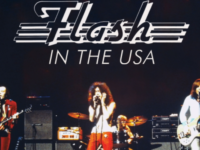Best remembered as the band that featured guitarist Billy Gibbons, who eventually reaped universal fame with ZZ Top, the Moving Sidewalks were actually a very popular local act hailing from Houston, Texas. A hot live attraction, they produced a few singles and a full-length album during their stint.
Originally released on the Tantara label in 1969, Flash (reissued by Akarma Records in 2000) provides ample servings of heavy psychedelic-blues rock cuisine. The Moving Sidewalks were especially enamored with Jimi Hendrix, and such a fixation religiously invades their material. Soulful vocals, dazzling riffs, bursts of distorted feedback and patches of cosmic impressions shamelessly ape the lauded performer. The admiration was mutual, however, as Jimi publicly praised Billy, calling him his favorite new guitar player, after catching a Moving Sidewalks show.
A slow burning blues pitch blankets songs like “You Don’t Know The Life” and “Joe’s Blues,” where “Flashback,” with its creaky organ flourishes and insistent beat, romps and rolls to an art-damaged acid rock stance. Dripping with melodrama, a cover of “No Good To Cry,” which was initially written and recorded by the Wildweeds, further illustrates the band’s ability at drowning themselves in the blues, while “You Make Me Shake” sizzles with fuzzy static and “Eclipse” and “Reclipse” are formed of spacey shapes and electronic sound effects.
Prior to the arrival of Flash, the Moving Sidewalks were a rough-and-ready garage rock band, and the 2000 collection — along with including the album in its entirety — tacks on some of the early stuff. Fueled by driving keyboards, skittish breaks and hormone-charged arrogance, “99th Floor” has deservedly been cited as one of the greatest songs of its kind. The two chord punch of “Need Me,” complete with a deadly howl, checks in as another first rate punk pounder, and a dark, droning treatment of the Beatles’ “I Want To Hold Your Hand” is so off the wall that it has to be heard to be believed.
- ‘Magic’ Wasn’t One-Hit Wonder Pilot’s Only Quirky, Radio-Ready Treasure - April 18, 2025
- How ‘Hollies Sing Hollies’ Showed New Promise After Graham Nash’s Exit - November 14, 2024
- Barry Melton on Country Joe and the Fish, Woodstock – and That Chant - August 15, 2024



